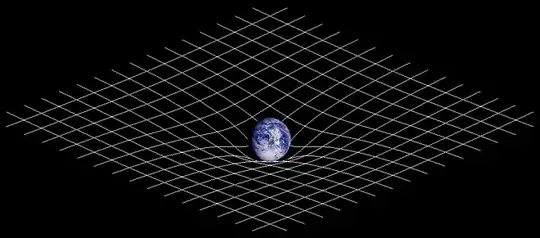The main question I am getting at is, does time dilation have a refractive index? What I mean is, if I were to shoot a laser past a black hole, would the laser's path "bend" strictly from time dilation not considering the gravitational effects?
We don't talk of gravitational lensing for nothing, but IMHO you're getting this back to front Joe. See what John Rennie said? Einstein said something similar, see for example this: the curvature of light rays occurs only in spaces where the speed of light is spatially variable". Now take a look at the Wikipedia Riemann curvature tensor article, and see this depiction of curved spacetime:
 CCASA image by Johnstone, see Wikipedia
CCASA image by Johnstone, see Wikipedia
Imagine that we had a whole load of light clocks, and we dotted them throughout an equatorial slice of space around the Earth. Because the speed of light is spatially variable, the light-clock rates vary. When we plot them, such that lower slower clock rates are depicted as lower down in a 3D depiction, and higher faster clock rates are depicted as higher up, we get the picture above. Time dilation doesn't have a refractive index. Time dilation is there because space has something akin to a refractive index. Because a concentration of energy in the guise of the Earth "conditions" the surrounding space, altering its metrical properties, this effect diminishing with distance. Einstein's exact words were:
"According to this theory the metrical qualities of the continuum of space-time differ in the environment of different points of space-time, and are partly conditioned by the matter existing outside of the territory under consideration. This space-time variability of the reciprocal relations of the standards of space and time, or, perhaps, the recognition of the fact that 'empty space' in its physical relation is neither homogeneous nor isotropic, compelling us to describe its state by ten functions (the gravitation potentials g$_{\mu\nu}$), has, I think, finally disposed of the view that space is physically empty."
Note how Einstein referred to inhomogeneous space? IMHO
Inhomogeneous vacuum: an alternative interpretation of curved spacetime is worth a read. People tend to think of curved spacetime as curved space and curved time, but IMHO it's better to think of it as inhomogeneous space where the inhomogeneity or your plot of measurements or your metric is curved. Metric is to do with measurement.
I know that you cannot have the gravitational time dilation without gravity but would there be a way to separate the time dilation effects from the gravitational effects for the sake of the question?
Yes, look at the picture above again. Gravitational time dilation relates to the depth of potential, the force of gravity depends on the slope, and the tidal force relates to how curved it is.
 CCASA image by Johnstone, see
CCASA image by Johnstone, see